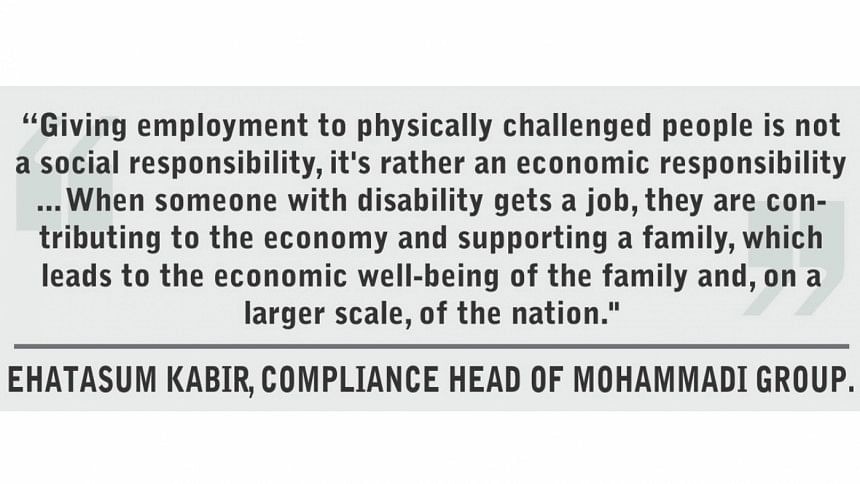Workplaces not friendly at all

It was not her inefficiency why Sumi (not her real name) had to quit her job. Rather, it was the operation hours of an elevator that made it impossible for her to reach her workplace every morning on the 4th floor of a building.
She cannot move without her prosthetic leg, an artificial organ that does not allow her to take the stairs.
"On certain days, my work hours started from 5:35am but the liftman of the building did not come so early," she said, adding that explaining the problem to her boss was not of any help either.
She requested the liftman to come earlier but her plea fell on deaf ears. "Twice I tried to climb the stairs with the help of my family only to suffer afterwards from severe pain in my leg," she said.
"I finally had to request my boss to change my early morning shift, but he told me straight away that if I could not do my job I should just quit," she said.
Nazrul Islam, assistant sub-inspector at the food ministry, shared a similar experience. He cannot move without a wheelchair.
"Often when I go to other government offices housed in buildings without elevators, even top government officials fail to take my physical challenges into account," he said.
A couple of months back, he went to attend a meeting at another department where the elevator was not working. "When I called the official with whom I had the meeting to come downstairs, he kept me waiting for hours," he said.
Nazrul said even at his own office, which is on the ground floor, there were four steps that one needed to climb. So he built a ramp with his own money to overcome this difficulty.
"I had brought the matter to the notice of the authorities but they did not take any step immediately," he said.
"The problem is with the attitude employers have on persons with physical challenges. They think such persons should sit idle at home rather than working at office," said Nazrul, recalling how, during job interviews, he found his employers being suspicious of his abilities.
Both Sumi and Nazrul said it was almost impossible for people like them to get a job, especially in the private sector, without sufficient lobbying.
Even the 10% quota reserved for people with disabilities (PWDs) remain unfulfilled, said Nazrul.
Saidul Huq, president of National Forum of Organisations Working with the Disabled (NFOWD), also said employers “are not mentally prepared” to offer jobs to physically challenged people. When they got a job, colleagues would not show a helpful attitude towards them, he added.
He said that through his organisation, Blind Education and Rehabilitation Development Organisation (Berdo), they “try to lobby for jobs” of about 10-12 persons with visual impairment every year.
Despite employers' reluctance, however, organisations that have employed physically challenged people speak highly of their job performance and loyalty.
Shihabul Kabir, senior assistant manager of Renata Limited, said 16 persons with mental and physical challenges “work at the packing section of the company.”
"We did not have to do much adjustment as the working area is on the ground floor. In fact, to some extent, they are better workers, because they do not waste time and they are more dedicated," he said.
But the company does not directly recruit physically challenged people. It recruits them through a non-government organisation called Sajeda Foundation.
Ehatasum Kabir, compliance head of Mohammadi Group where eight physically challenged persons are employed, opined that giving employment to physically challenged people “is not a social responsibility”, it's rather an economic responsibility.
"When a person with disability gets a job, he is contributing to the economy and supporting a family, which leads to the economic well-being of the family and, on a larger scale, of the nation," he said.
He, however, noted that physically challenged people should be given work where they feel comfortable.
Saidul of NFOWD said, "If the buildings were constructed following the law, then physically challenged people could easily enter them. And if employers activate free software available online, it helps visually impaired persons to work as efficiently as a person without visual impairment."
At Creative IT Limited, there are many software developers who suffer from hearing impairment. Md Monir Hosen, chairman and CEO of the company, said his employees, especially those with hearing impairment, were doing very well.
"All you need to do is give them proper training," he said.

 For all latest news, follow The Daily Star's Google News channel.
For all latest news, follow The Daily Star's Google News channel. 







Comments